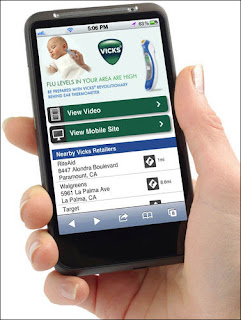Mobile is the new "shiny thing" of interest to pharmaceutical marketers. As evidence of this, there are more and more drug industry conferences that are dedicated to mobile or have tracks or whole days dedicated to mobile. Mobile Healthcare Communications 2012, for example, is one of them. I will be at that conference moderating a roundtable discussion on "Overcoming Mobile Healthcare Compliance Challenges." [The producers of that conference are a client, but I am not being paid to write this post.]
According to my currently-running "Predicting the Future of the Drug Industry: 2012 and Beyond" survey, 72% of respondents agree/strongly agree that the next "BIG opportunity for targeted marketing to patients and physicians is mobile apps on smart phones."Until recently there were not many pharma mobile applications out there worthy of writing about. previously. Most marketers were discussing only SMS (text messaging) as the best example of using mobile to motivate people to take their medicine. Boring!
I have written about issues related to use of mobile devices by pharma, including the following posts and articles:
- FDA Issues Long-Awaited Guidance - for Mobile Medical Apps. Janssen, Look Out!
- The iPad as a Pharma Marketing Platform
- Challenges of Regulating Mobile Medical Apps
- Mining Mobile Health App User Data
- Checking Under the Hood of Pharma Mobile Apps
- Everything You Need to Know About Mobile Platforms
Other apps are aimed at physicians, such as Janssen's "Psoriasis" (PASI) app for the iPhone and iPad that may need FDA approval as a medical device (see here).
There are no pharma apps that I know of that directly help to sell drugs or vaccines. I mention vaccines because I just found out about a P&G "Vicks" branded mobile app/device combination that could be a model for improving the sale of vaccines, especially for the flu. It's a mobile advertising campaign for a behind-the-ear thermometer by Vicks that is "designed to display the ad only in areas where there is a high incidence of the flu and only to mothers, the primary purchasers of thermometers" (see "Using Google Data on Smartphones to Target Consumers for Ads").
Couldn't an app like this be created by a pharma company to promote its flu and other vaccines? Or even OTC medicines during allergy season? Perhaps even Rx drugs if Google had the right kind of targeting data?
There are, of course, some regulatory hurdles to overcome. Since the Vicks app is integrated with a device (thermometer), perhaps it should be regulated by the FDA as a medical device.
Another challenge is the relationship between Google and the pharma industry. While Google is bending over backwards to provide help to consumer goods agencies about how best to do display advertising via its network (see "Google Increases Investment in Display Ads"), I don't think Google is providing the same level of services to pharma agencies. A representative of Google recently said "pharma needs to leverage the Internet" and that "pharma was not considered a key client by Google because of pharma’s low spend" (see here).
To create truly useful mobile apps that have ROI, pharma needs to invest more in interactive media overall. Otherwise, it will continue to develop marginally useful apps that are used once and then forgotten, IMHO.


I absolutely agree but I think there is a cure. I think we as marketeers often fail to raise the bar becuase we are afraid of challenging the customers and tell it to their face when their ideas are bad. Too many accept the customers "I think this could be fun to make" ideas, which falls to align with customer wants and needs. At Vertic Healthcare we recently experienced that situation but through a very good process of using statistics about user needs, platform usage, content preferences as well as sales rep involvement developed a medical app that hit Top-10 medical apps and met annual download and sign up expectation in just 6 months. I believe every single company can make a successful app or mobile website if they have a digital strategy and customer insight in place. read more at http://www.vertic.com/healthcare/mobile-health Mikkel Arnoldi Pedersen
ReplyDelete